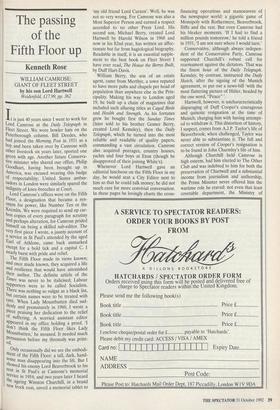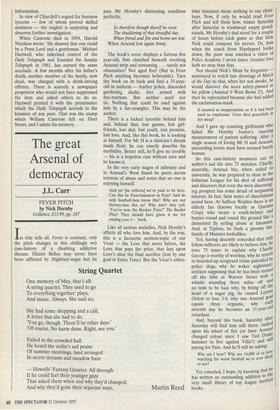The passing of the Fifth Floor up
Kenneth Rose
WILLIAM CAMROSE: GIANT OF FLEET STREET by his son Lord Hartwell Weidenfeld, £17.99, pp. 362 It is just 40 years since I went to work for Lord Camrose at the Daily Telegraph in Fleet Street. We wore bowler hats on the Peterborough column. Bill Deedes, who had joined the Morning Post in 1931 as a boy and been taken over by Camrose with other livestock six years later, sported one green with age. Another future Conserva- tive minister who shared our office, Philip Goodhart, having been brought up in America, was excused wearing this badge of respectability; United States ambas- sadors in London were similarly spared the indignity of knee-breeches at Court. Lord Camrose's offices were on the Fifth Floor, a designation that became a syn- onym for power, like Number Ten or the Kremlin. We were required to send up car- bon copies of every paragraph for scrutiny and perhaps alteration, for Camrose prided himself on being a skilled sub-editor. The very first piece I wrote, a jaunty account of a service in St Paul's attended by the aged Earl of Athlone, came back unmarked except for a bold tick and a capital C. I nearly burst with pride and relief. The Fifth Floor made its views known; and once made known, they acquired a life and resilience that would have astonished their author. The definite article of the Tones was never to be italicised; Labour supporters were to be called Socialists. There was nothing so vulgar as a black list, but certain names were to be treated with care. When Lady Mountbatten died sud- denly and prematurely in 1960, I wrote a piece praising her dedication to the relief of suffering. A worried assistant editor appeared in my office holding a proof. 'I don't think the Fifth Floor likes Lady Mountbatten,' he moaned. It needed much Persuasion before my threnody was print- ed.
Only occasionally did we see the embodi- ment of the Fifth Floor: a tall, dark, hand- s°, me man disappearing into the lift. But I snowed his enemy Lord Beaverbrook to his seat in St Paul's at Camrose's memorial service in 1954; and two years later I heard the ageing Winston Churchill, in a brand new frock coat, unveil a memorial tablet to `my old friend Lord Curzon'. Well, he was not so very wrong. For Camrose was also a Most Superior Person and earned a respect accorded to no other Press Lord. His second son, Michael Berry, created Lord Hartwell by Harold Wilson in 1968 and now in his 82nd year, has written an affec- tionate but far from hagiological biography. Readable in itself, it is an essential supple- ment to the best book on Fleet Street I have ever read, The House the Berrys Built, by Duff Hart-Davis.
William Berry, the son of an estate agent, came from Merthyr, a town reputed to have more pubs and chapels per head of population than anywhere else in the Prin- cipality. Making his way to London aged 19, he built up a chain of magazines that included such alluring titles as Caged Birds and Health and Strength. As his fortunes grew he bought first the Sunday Times (later sold to his brother Gomer Berry, created Lord Kemsley), then the Daily Telegraph, which he turned into the most reliable and readable of quality papers, commanding a vast circulation. Camrose also acquired peerages, country houses, yachts and four boys at Eton (though he disapproved of their joining White's).
Whenever Lord Hartwell gave an editorial luncheon on the Fifth Floor in my day, he would seat a City Editor next to him so that he could talk money; he did not much care for more convivial conversation. In these pages he lovingly charts the cross- financing operations and manoeuvres of the newspaper world: a gigantic game of Monopoly with Rothermere, Beaverbrook, Iliffe and the rest. But even Camrose had his bleaker moments. 'If I had to find a million pounds tomorrow,' he told a friend in 1931, 'I am not sure where I would turn.'
Conservative, although always indepen- dent of the Conservative Party, Camrose supported Churchill's robust call for rearmament against the dictators. That was the finest hour of the Daily Telegraph. Kemsley, by contrast, instructed the Daily Sketch, after the signing of the Munich agreement, to put out a news-bill 'with the most flattering picture of Hitler, headed by the one word, "Peace" '.
Hartwell, however, is uncharacteristically disparaging of Duff Cooper's courageous and quixotic resignation at the time of Munich, charging him with having attempt- ed to withdraw it. This distortion of history, I suspect, comes from A.J.P. Taylor's life of Beaverbrook; when challenged, Taylor was never able to substantiate it. The full and correct version of Cooper's resignation is to be found in John Charmley's life of him.
Although Churchill held Camrose in high esteem, had him elected to The Other Club and was indebted to him for both the preservation of Chartwell and a substantial income from journalism and authorship, the Prime Minister never offered him the wartime role he craved: not even that least covetable department, the Ministry of
Information.
In view of Churchill's regard for business tycoons — few of whom proved skilled ministers — the neglect is surprising and deserves further investigation.
When Camrose died in 1954, Harold Nicolson wrote: 'He showed that one could be a Press Lord and a gentleman.' Michael Hartwell, who inherited control of the Daily Telegraph and founded the Sunday Telegraph in 1961, has earned the same accolade. A few months after his father's death, another member of the family, now dead, was charged with a drink-driving offence. There is scarcely a newspaper proprietor who would not have suppressed the item and asked others to do so. Hartwell printed it with the prominence which the Daily Telegraph accords to the kinsmen of any peer. That was the stamp which William Camrose left on Fleet Street, and I salute his memory.



























































 Previous page
Previous page